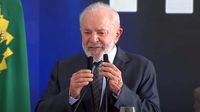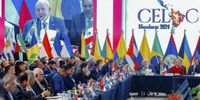In a powerful address at the Celac summit in Honduras on April 9, 2025, Brazilian President Luiz Inácio Lula da Silva emphasized the futility of trade wars, stating that such conflicts only serve to destabilize the global economy. This remark came during the opening session of the Community of Latin American and Caribbean States (Celac), where leaders gathered to discuss pressing regional issues.
“There are no winners in a trade war,” Lula declared, urging that the consequences of such conflicts extend far beyond national borders. He pointed out that attempts to restore old hegemonies threaten the sovereignty of nations in the region, with freedom and self-determination often becoming the first casualties in a world lacking agreed-upon multilateral rules. Lula's comments echoed a growing concern among Latin American leaders about the rising tide of protectionism and unilateralism in global trade.
During his speech, Lula highlighted the plight of migrants, who are frequently criminalized and deported under degrading conditions. He also criticized arbitrary tariffs that destabilize the international economy and drive prices up for consumers. "History teaches us that trade wars have no winners," he asserted, reinforcing the need for unity among Latin American and Caribbean nations.
Lula's remarks came against the backdrop of a stark statistic: in 2023, trade among Latin American and Caribbean countries accounted for merely 14% of the region's exports. This figure underscores the economic fragmentation that Lula believes must be addressed if the region is to avoid becoming a mere zone of influence for global superpowers.
To combat these challenges, Lula proposed a structured action plan focusing on three key areas: consolidating democracy, addressing climate change, and enhancing economic and commercial integration. He argued that the stronger and more united the economies of Celac member states are, the better they can protect themselves against unilateral actions that could jeopardize their economic stability.
“Brazil's annual trade with Celac countries amounts to US$ 86 billion, which is greater than what we have with the United States and close to our trade volume with the European Union,” Lula noted. He stressed the importance of promoting regional trade in goods and services, diversifying trade relationships, and facilitating easier exchanges among the countries in the region.
In addition to economic discussions, the summit aims to tackle significant issues such as hunger, climate change adaptation, and responses to natural disasters. Lula's participation in the summit included a lunch with fellow heads of state, during which these critical topics were likely further explored.
On the same day, Lula also took the opportunity to criticize former U.S. President Donald Trump, promising to respond to economic measures with reciprocity. This statement reflects the tensions that have arisen between Brazil and the United States, particularly regarding trade policies and tariffs.
Lula's strong stance against protectionism and his call for regional unity resonate with many leaders across Latin America, who are increasingly wary of external pressures and the potential for economic isolation. His vision for a more integrated and cooperative Latin America seeks to empower the region to stand firm against the challenges posed by powerful nations.
As the Celac summit progresses, the discussions among member states will be crucial in shaping a collective response to the economic and environmental challenges facing the region. With Lula at the helm, Brazil is positioning itself as a leader in advocating for a united Latin America that prioritizes mutual support and collaboration over divisive trade conflicts.
Lula's remarks and the summit's agenda reflect a critical moment for Latin America as it navigates the complexities of global trade dynamics while striving to enhance the well-being of its people through cooperation and solidarity.
As the world watches, the outcomes of the Celac summit could have lasting implications for the region's economic future and its ability to assert itself on the global stage.






